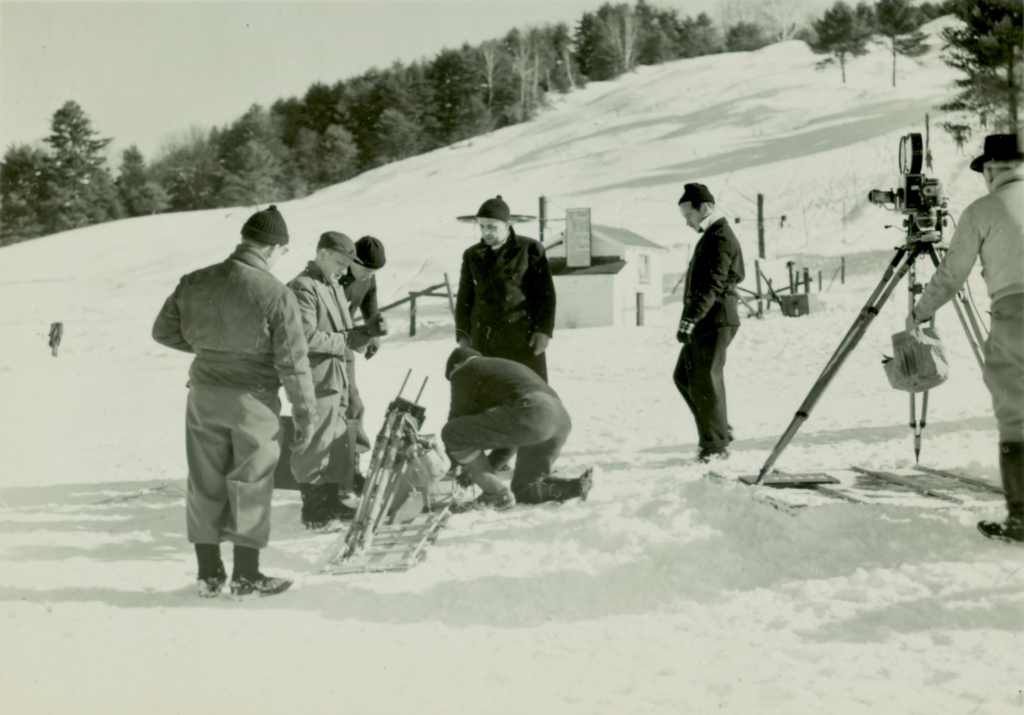
Photograph by Adrian Bouchard | Courtesy of Dartmouth College Photographic Files
Here follows Editor-in-Chief Matthew O. Skrod’s introduction to The Dartmouth Review’s themed issue of November 7, 2023: “Dartmouth at the Movies.” Links to the articles which appeared in that edition are provided below Mr. Skrod’s introduction.
Today, familiarity with the names of alumni who work in the film industry is a matter of common consciousness at Dartmouth. Among the notables of whom I speak are the actor David Harbour ’97, the directors Phil Lord ’97 and Chris Miller ’97 (last year’s Commencement speakers), and Chris Meledandri ’81, who founded and now serves as CEO of Illumination. Rather less well known, however, are the innumerable Dartmouth alumni who had influential careers in the film industry in the twentieth century. Nor, for that matter, do many know of the College’s historical involvement in advancing the academic study of film.
Born of The Dartmouth Review’s longstanding interest in and commitment to Dartmouth history, the goal of this themed issue, our second such issue in as many terms, is to work to close this gap in student and indeed alumni knowledge.
For our purposes, the great story of Dartmouth in film history begins with a triumvirate of future film producers who passed through the College at roughly the same time: Arthur Hornblow, Jr. ’15; Walter Wanger ’15; and Gene Markey ’18. All three were active in theater in their undergraduate years, and they all went on to become well-known film producers.
Hornblow produced films at both Paramount and M-G-M and ultimately as an independent. He was responsible for such quality films as Gaslight (1944), The Asphalt Jungle (1950), Oklahoma! (1955), and Witness for the Prosecution (1957). Wanger is probably the most familiar to Dartmouth students and alumni, for it was he who produced the dismal Winter Carnival (1939), which was shot partially on location at the College. Wanger was long an independent producer and was commonly regarded as one of the more cerebral men in the business (notwithstanding his 1952 conviction for shooting his wife’s lover in the groin). He was president of the Academy of Motion Picture Arts and Sciences (AMPAS) for six years, the recipient of an Honorary Academy Award, and the producer of great films such as Stagecoach (1939), Foreign Correspondent (1940), Scarlet Street (1945), and The Reckless Moment (1949). Markey spent most of his career as a writer and line producer at Twentieth Century-Fox, and his enduring films include Suez (1938), The Little Princess (1939), and The Hound of the Baskervilles (1939). He also became a staple of the social scene on Hollywood and Vine.
A strange feature of these three producers lies in their marriages and divorces: The actress Joan Bennett was married to Markey, then to Wanger; the actress Myrna Loy was married to Hornblow, then to Markey.
When Wanger made Winter Carnival, he hired a Dartmouth alumnus, Werner Janssen ’21, to score the film. Janssen, who had a distinguished career as a composer and conductor, ultimately wrote music for several of Wanger’s films. Also employed on Winter Carnival was the eminent screenwriter Budd Schulberg ’36 (whom Wanger fired from the project for procrastinating alongside an inebriated F. Scott Fitzgerald). Schulberg was later to win an Academy Award for his screenplay for On the Waterfront (1954).
Schulberg had grown up in the industry (his father was the head of production at Paramount), and one of his closest friends was the similarly industry-born Maurice Rapf ’35, whose father was a producer at M-G-M. “Maury” was also a Hollywood screenwriter but found
himself blacklisted in the McCarthy era. He ultimately made his way back to Dartmouth, where he became a much-loved professor of film studies.
Also blacklisted was Frederic Rinaldo ’24, a screenwriter responsible for splendid comedies like Abbott and Costello Meet Frankenstein (1948).
The director Joseph Losey ’29, today regarded as among the greatest filmmakers of all time, was also blacklisted in the 1950s, whereupon he moved to Europe to continue making films. It was there that he crafted masterpieces such as The Servant (1961), The Go-Between (1971), and Monsieur Klein (1976).
The actor Robert Ryan ’32, known for his sensitive and emotional characterizations in films such as Act of Violence (1948) and On Dangerous Ground (1951), was not blacklisted but was an outspoken opponent of McCarthyism.
The 1950s saw a new generation of Dartmouth graduates enter the film industry. Buck Henry ’52 went on to script films including The Graduate (1967), Catch-22 (1970), and What’s Up, Doc? (1972). David Picker ’53 became a film producer and executive, and he played a large role in the creation of the James Bond series and the production of the Beatles’ A Hard Day’s Night (1964). Bob Rafelson ’54 became a key filmmaker in the New Hollywood movement, directing films like The Postman Always Rings Twice (1981).
Dartmouth’s Department of Film was formally established in 1992, but substantial study of film nonetheless ensued at the College in preceding years. A particular boon to Dartmouth was the 1984 hiring of John Michael Hayes—who wrote films for Alfred Hitchcock that included Rear Window (1954)—to teach courses on screenwriting.
In all, we at The Review intend to present in this issue a variegated glimpse into Dartmouth and film. We hope you enjoy.
Dartmouth at the Movies
“Animal House Turns 45: A Dartmouth Story”
“Telluride Comes to Dartmouth”
“A History of the Dartmouth Film Society”
“Review Reviews: The American Buffalo”
“Gems of a Bygone Era: Rauner’s Classic Film Script Collection”
“An Interview With Robert Gitt ’63”
“An Interview With David Thomson, Film Critic and Historian”

Be the first to comment on "Introduction by the Editor: Dartmouth in Film History"